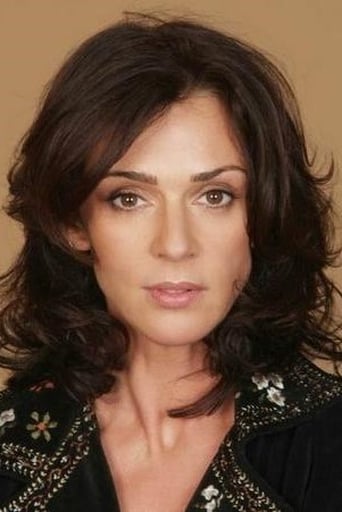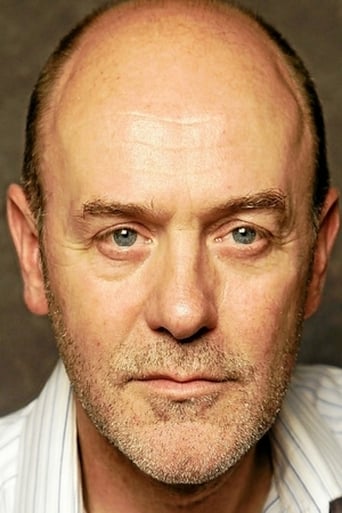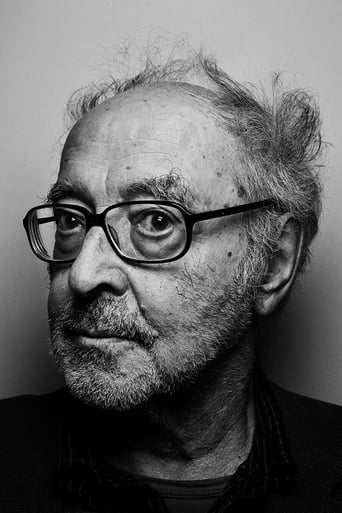LastingAware
The greatest movie ever!
Catangro
After playing with our expectations, this turns out to be a very different sort of film.
Humaira Grant
It’s not bad or unwatchable but despite the amplitude of the spectacle, the end result is underwhelming.
Roy Hart
If you're interested in the topic at hand, you should just watch it and judge yourself because the reviews have gone very biased by people that didn't even watch it and just hate (or love) the creator. I liked it, it was well written, narrated, and directed and it was about a topic that interests me.
ansar-m6
Prologue:
From 1967 and 1979 Godard abandon his new wave roots, and committed himself to producing political films. Of which made certain foreign critics distance themselves from Godard, leaving him rarely discussed and ignored for a decade. This seems to make his post new wave work not canon, Pierrot Le Fou was apparently his last film. But the 80s saw a return to Godard's new wave esque subject matter, rewarding his frequent viewers with intertextuality, and taking over the narrative surrounding his legacy up to that point.In an 1980 interview, televised on the American television talk show: the Dick Cavett show; Godard promotes the first of his post-new wave films "Slow Motion". Cavett begins by asking honestly and softly, "The word comeback has been used to describe this film (Slow Motion), does that word "comeback" offend you in anyway?". Godard tenderly responds with, "In a sense because.. i never went away. Maybe I was pushed away, and to me, i'd rather say that this the reverse of "comeback", a.. what would you say, a come-fourth or go-forth..", with Cavett reiterating, "a continuation". Which is an interesting contextually when viewing First Name: Carmen. Actually to view any of Godard's films requires some understanding of context, as Godard is actually neither mysterious nor cryptic. In Breathless, the use of jump cuts, the characters as reference to Hollywood Noir films: the story, the sound, the edit, the camera, the actors; Godard makes every aspect of his film a character, to highlight and analyze and subvert. In Godard's early work, he sought to subvert every conception of what film grammar was. Context was his gun, the film reel the revolver, the image the bullet. The result is a sort of reflexive idiosyncratic lucidity. Yes I made that phrase up, yes it's super pretentious, but look up each word and combine it, and you'll just get what I mean. Godard makes his films with the atmosphere of the movie theatre in mind, he knows it is his canvas, so the way he expresses himself on this form is almost painterly or symphonic, he projects a thematic cinematic quality, a "Je e sais quoi" that all great filmmakers have. That's an update on Godard up to this point. I'll now break down First Name: Carmen.
Review:
Godard's "Prename: Carmen", with Maruschka Detmers as the titled character: follows a young woman who asks her Uncle, a faux-senile ex-filmmaker played by Godard himself, to help herself and her associates produce a documentary. In the meantime, Carmen and her posse rob banks and plan kidnappings as a means for... crowd funding. On a very casual heist, a handsome security guard attempts to fight off the robbers, but ends up falling in love and running away with Carmen instead. Godard explores love, lust, society, and his reputation all within the intertextual package of Raoul Coutard's (15th and final collaboration w/ Godard) subtle and dreamy cinematography. Godard plays with the idea of his reputation, he plays an old filmmaker outed from the industry. While his niece wants to help him make a comeback, the film that she suggest they make.. seems to play out within this very film, they are in the film talking about the film itself. The documentary she wants to make is the fiction of which is this film, of which Godard directs within outside the film. Is the story of a film another character, one who you can't even gossip about since he's in the room? This is post-modernism btw. Uncle Jean even wonders to one of Carmen's filmmaker friends, over cigarettes and coffee: "You're not making a real documentary, are you?", "I hope that documentary is fiction.". That scene within itself allows Godard to contemplate his own film while he is simultaneously immerse in its frame. I think you get it.He even features randomly cuts to group of orchestral musicians playing the score of the film that was just overlapping the story. They give each other notes, they are in front of an being the frame of the image. Godard shows the character behind the character of his film.Carmen, with the handsome security guard played by Joseph Bonnaffé, folic around in Uncle Jean's condo after the heist, the location she got the green light to shoot the documentary. Again, Godard references himself, a long scene with a couple going back and forth about their ambitions. As Breathless was of foreplay, and Le Mepris of dissolution, Godard comments on the nature of the male and female relationship in general. The elusive femme fatale, the aggressive male courter. Enchantment and disenchantment. Lustful aggression, every push is a kiss. He rips open her shirt, he gets on his knees and lays his head on her tender bare chest, "Why do women exist". She calls him Jo instead of Pierrot, he corrects her, it's Joseph. "If I love you, that's the end of you". Adjacent to jarring cuts to crashing waves on the shore, always moving, glowing, tranquil, full of beauty and terror, like rushes of blood, like sex and heaven.The documentary is now to be shot in a Paris hotel, a nicer one than Patricia's. The relationship dissolves there, Joseph can now only touch the empty static of the television, nothing and no one to turn to. She's disgusted by him, his love was the end of him. Uncle Jean agreed to shoot a casino film when he talked over coffee and cigs with one of Carmen's friends. The posse plans to kidnap a rich father and daughter their. Joseph wants to get in on the plan, but he's excluded, he won't give up on Carmen. The kidnapping fails, Joseph shoots Carmen, lovers are cowards. They are "innocent and guilty", even when all is lost, we will still wake up the next day. New again. Closing:
Two mysteries left with this film. There is this documentary on you tube called "Jean-Luc Godard / Anna Karina" which details their relationship. But also reveals that each of his films from Vivre Sa Vie to Pierrot Le Fou, are subtly and not subtly layered and even revolve around how he fell in not out of love with Karina. Which leaves me to question what the relationship in this film is a reference too.That's as much as I could articulate in words what Godard was conveying in this film at the moment, i've only seen it once. It is one of his most dense and articulate pieces, an incredibly over looked gem. I suggest becoming familiar with Godard's other works and the context behinds those films as well, as this film rewards you with subtle homage, layered with new context. I hate this phrase, Godard's Prenom: Carmen is a tour de force. Be warned, only watch this after your 6th or 7th Godard film, and maybe a documentary, and interview.
tieman64
"The human being under the skin is, for all lovers, a horror and unthinkable, a blasphemy against love." - Nietzsche Jean-Luc Godard's "First Name: Carmen" opens with lines of cars and trains travelling in opposite directions. We then cut to roiling waves. "It's in me, in you, like terrible waves," someone says, later identified as Claire (Myriem Roussel), one of a string quartet busy rehearsing Beethoven. We then cut to a mental hospital. Here rests Godard, who plays himself within the film. Broke and so feigning illness for board and bed, he sits before a typewriter. The lights dim.What follows is a fantasy spun by the now sleeping Godard. Here he imagines the movie he'd have made with his niece, a girl whom he "always adored" and whom he "always wanted to make a film with". His niece's name is Carmen (Maruschka Detmers), and so he casts her in a stylised version of Georges Bizet's "Carmen", a nineteenth-century opera. "Should I ask why you're here?" Carmen asks, when she's conjured before Godard. "Sure," he self-reflexively replies, "it'll provide some dialogue." Within this film within a film, Carmen plays a criminal who robs banks, falls in love with a soldier (Joseph) and stages a movie production as cover for yet another heist. Significantly, she films this fake movie with "Godard's new camera" which we learn "makes music". "Name's" aesthetic itself attempts to mimic the ebbs, flows and logic of Opera, dance and classical music. Carmen's tale is also framed by Claire's music recitals, with the moods and rhythms of the former influencing the latter, and vice versa. "Be mysterious!", "Develop tragedy!", "Improvise!" Claire's associates say, orders which Carmen herself obeys.Still, the film's central character remains the oft off-screen Godard. Throughout the film, Carmen becomes emblematic of a fantasy image which he repeatedly creates and yearns for. She's "the first name": the fantasy that exists before actual identity. As men approach, Carmen recedes, as they move close, she disappears, a push-pull dynamic encapsulated by Godard's cutaways to turbulent ocean waves. These waves appear throughout the film, crashing and churning like we imagine the on-screen Godard tosses and turns in his own bed.Significantly, it is the clichés and conventions of cinema which prevent Carmen and Joseph being together. The closer he gets, the quicker she runs off on some ridiculous adventure. She remains in the realm of cinema, desire, love and longing, he in the realm of flesh and disappointment. Throughout the film, suffering and joy ritualistically dance, but power itself is continuously constructed and deconstructed; Carmen's never just a fetish object upon which Joseph, or the spectator, exerts power. In her own way, she asserts her own control, her own tidal forces.Unable to possess her, Joseph finally explodes into rage. He masturbates frantically over her image and then pathetically collapses. Desires cannot be satiated, only transferred. Epitomizing this is the film's obsession with "holes", an allusion to a very male drive to meet and go beyond desire; to transcend Lack, eradicate desire and penetrate into a "beyond". "Now I know why jail is called a hole," the soldier says, alluding to female orifices (vagina, anus etc), but also the trap of all yearning. The film itself begins with Godard wishing to "put his finger in a nurse's anus for 33 seconds" and ends with a "hole in Godard's jacket being sewn" by the very same nurse. "That's a long 33 seconds," he then quips, referring to the film he's trapped in, a feature length orgasm in which longings are patched up and desires temporarily postponed.For Godard, cinema, directors and men in general, are hopelessly fetishistic, always aroused by the mysteries of the female body. Their gaze is itself helplessly dependent, masochistic, misogynistic, exploitative, unashamedly masculine but ultimately impotent. There is nothing except desire for desire.But if Carmen exists in a world defined by men, trapped in a game of repetition and return, Claire exists in another realm. Spiritual, contemplative and sombre, she's detached from the carnal world of Carmen. We also learn that she too was once in love with Joseph, a man who eventually abandoned her. If Carmen's tale presents the male ego's experience of love, loss and impossibility, Claire represents the female flip-side. She's the victim of Godard's camera, conjured up and then discarded, left to contemplate the cruel eyes which regard her as inadequate."Carmen" is almost impenetrably symbolic. Trains and ships travel in opposite directions, signalling the widening gaps between our characters, and only when traffic streams merge do our guys and girls come together. Elsewhere Joseph caresses a TV, hoping to penetrate its screen and get at the fantasies within. This recalls what Rene Girard termed "memetic desire"; far from being autonomous, human desires are borrowed from other people and places. The film's aesthetic also alludes to Godard's previous films, alternating between pulpy crime clichés and political tracts. Other sequences feature Godard in a little symbolic tale. Here he's a failed director who has "lost everyone's money" and who now serves as a doormat for hip upstarts who use him to steal cash from unsuspecting audiences (with crime film clichés, no less). This refers to both Godard's return to feature film-making, and his refusal to bow to public and financial pressures."Carmen" was the second film in Godard's "body quartet" ("Slow Motion", "Passion", "Carmen", "Hail Mary", the latter also with a Joseph). It ends with the words "sunrise"; morning comes and the cranky dreamer awakes.7/10 – Multiple viewings required. See Antonioni's "Beyond The Clouds" for this material done better.
aimless-46
Cutting to the chase I can't imagine many viewers actually enjoying "First Name: Carmen". It is an ugly film with uninteresting sets, muddy documentary-style color, and silly to boring acting. Maruschka Detmers is on screen most of the time, often involved in the most non-erotic erotic scenes this side of "Bloody Mama"- shave those eyebrows baby!I kept feeling that I had seen this film somewhere before and finally I realized that I had it confused with another film. But this confusion illustrated how the extremes of the "film style continuum" actually meet and form a circle. And to my surprise Godard's new-wave creation closes this circle by linking up with the movie I kept being reminded of: Hillary Duff's "A Cinderella Story"; although they come at their more moronic qualities from opposite directions. Godard manages to purge Bizet's "Carmen" of all its beauty, energy, and suspense. Duff's adaptation of "Cinderella" succeeds in purging all the beauty, charm, and suspense from the classic "Cinderella". Both films star equally tired and vaguely repellent actresses, the slug-like Duff and the "I have hair in more places than Josh Harnett" Maruschka Detmers.They have virtually identical plots: Carmen wants to make a film-Sam (Duff) wants to attend Princeton, but neither has the money. Carmen attempts a bank robbery but is foiled by a guard-Sam applies for a Princeton scholarship but is foiled by her wicked stepmother (played by Stiffler's mom). Carmen meets Joseph during the robbery and they flee to her uncle's apartment barely avoiding capture-Sam connects with her anonymous cyber soul mate at the Halloween dance and flees to her fry-cook job just in time to avoid being caught. Carmen goes to a luxury hotel where they stage a film as a pretext for kidnapping a guest-Sam goes to a pep rally where the cheerleaders stage a play as a pretext for disclosing her identity and breaking up her budding romance. Carmen's kidnapping caper is foiled by the police-Sam's evil stepmother's inheritance scheme is foiled by the discovery of a secret will. Carmen goes out mumbling some expressionistic stuff to the bellboy-Sam's new boyfriend chooses Princeton over USC.Godard became famous by ignoring the established conventions of narrative, communicating visually in an ugly documentary style, and spending very little money during the production phase of his projects. The problem with his approach is that very few real and potential viewers can even hope to connect enough for these personal political essays to communicate anything. Duff's film's are too shallow to communicate anything substantial but they do connect to their audience of pre-teen viewers. As for "Carmen", run out and find me a pre-teen to explain the film to me, I can't make head or tail out of it.
Chris Bright
I've seen this once, which isn't really enough, but I found it the most sheerly enjoyable of Godard's later works. A kaleidescopic updating and deconstruction of the "Carmen" story, it's "Carmen", it's "Last Tango in Paris", it's a girl and a gun, it's the Keystone Kops, it gives us Godard as randy old pervert and it's informed throughout by Beethoven's beautiful late string quartets, which this film made me start listening to. It's also screamingly funny.I will admit to understanding about a tenth of this and Godard's later work is so personal that it's probably futile to hope that everything will become clear, but I shall see this again as soon as I get the chance. Hal Hartley (and Tarantino) eat your heart out....



